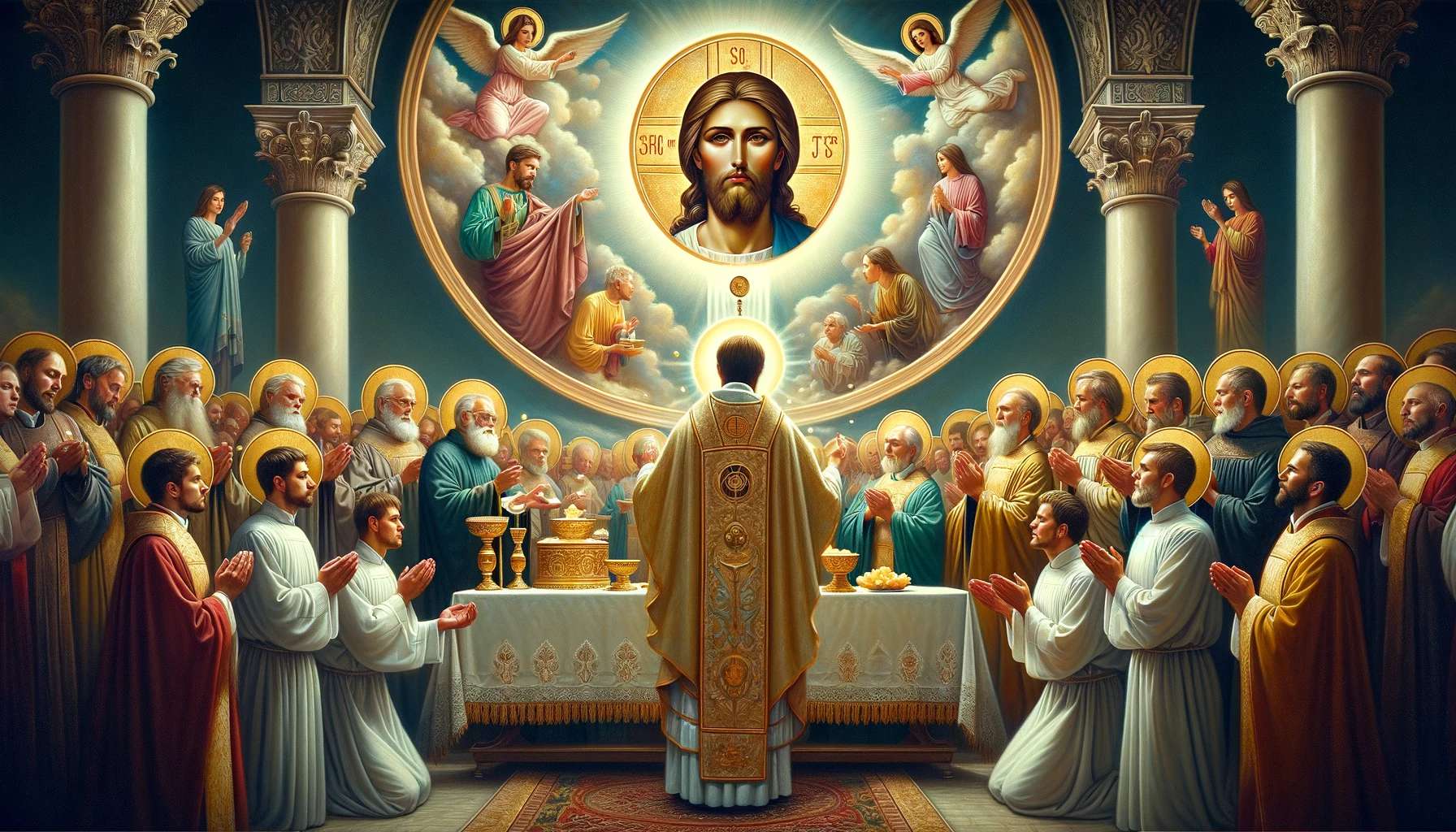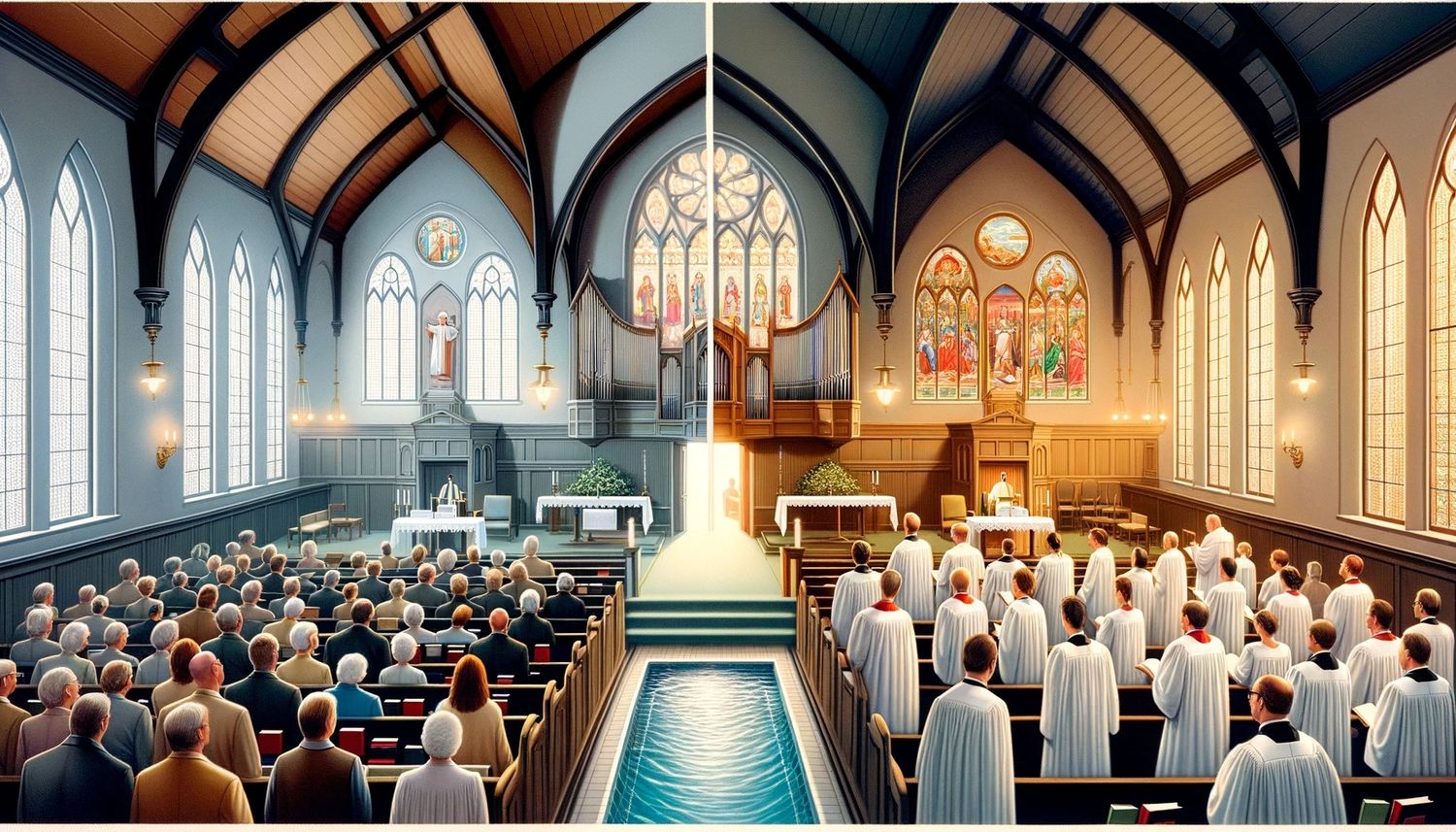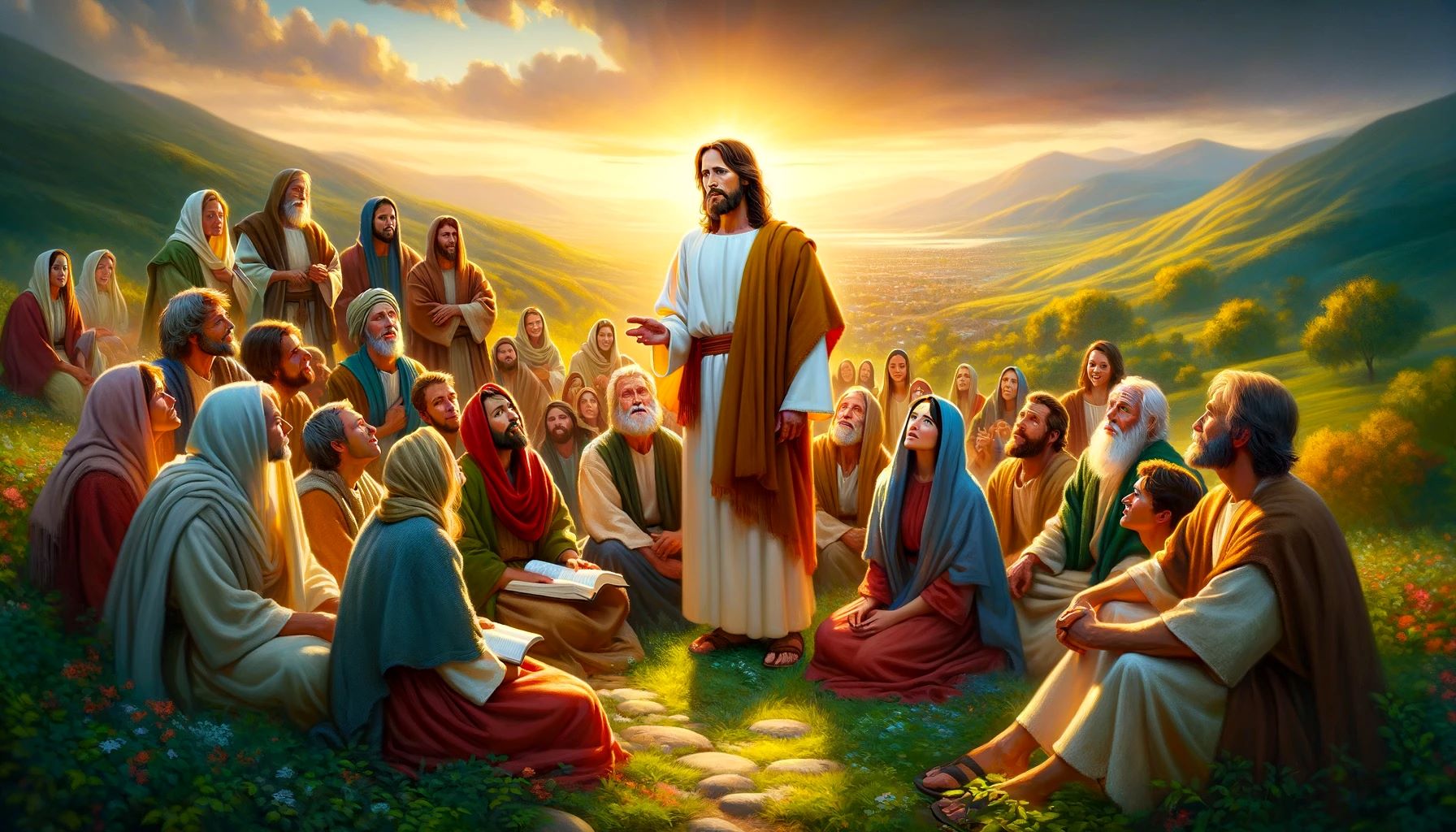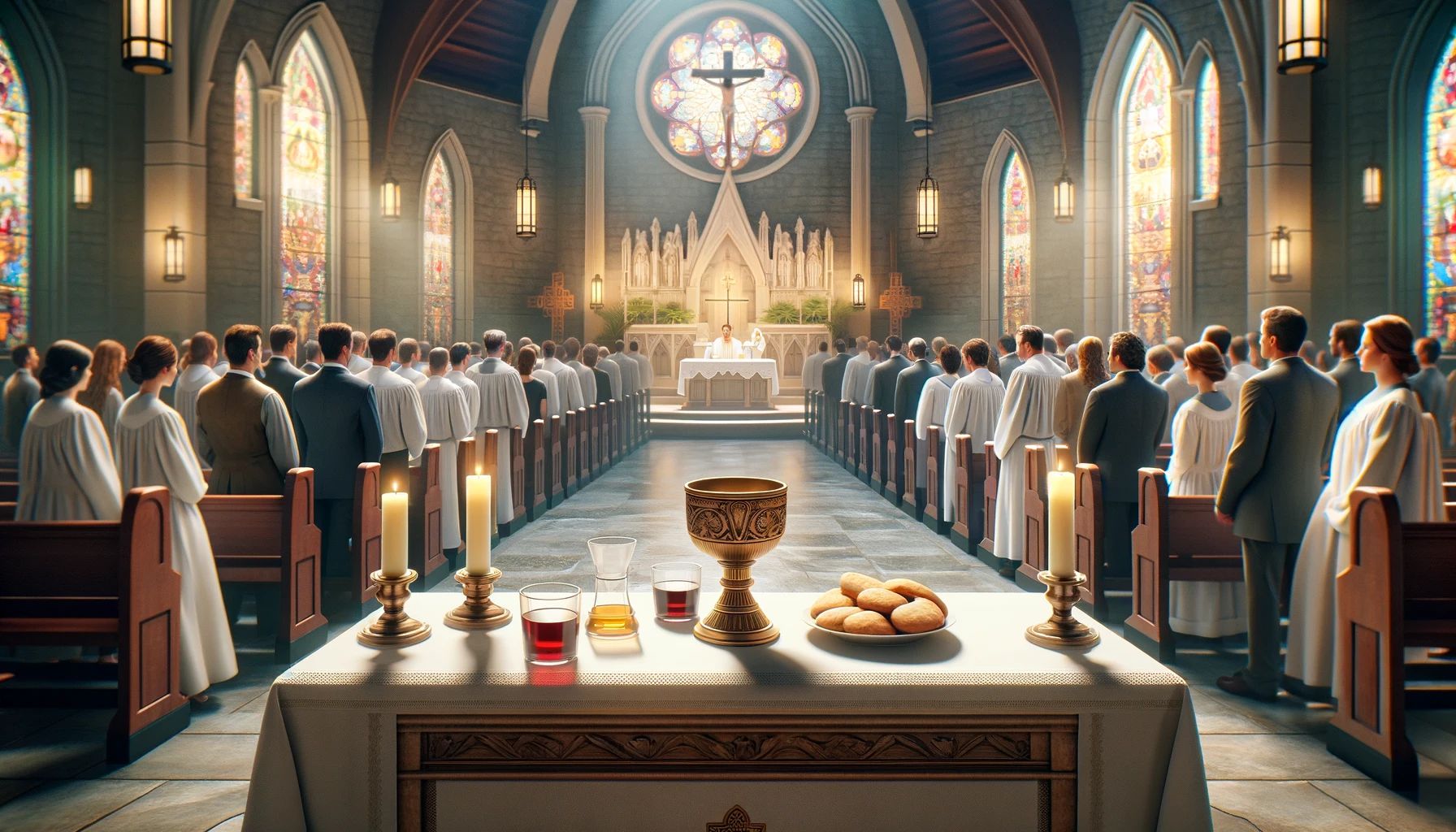Home>Theology and Spirituality>What Are The Different Views Of Communion


Theology and Spirituality
What Are The Different Views Of Communion
Published: February 25, 2024
Ericka Andersen, an editor at Christian.net, expertly merges digital strategy with content creation, focusing on faith and societal issues. Her communication skills enhance the platform's engaging narratives, fostering meaningful dialogue on belief's impact on society.
Discover the various perspectives on Communion in theology and spirituality. Explore the different views and interpretations of this sacred practice.
(Many of the links in this article redirect to a specific reviewed product. Your purchase of these products through affiliate links helps to generate commission for Christian.net, at no extra cost. Learn more)
Table of Contents
Introduction
Communion, also known as the Eucharist or the Lord's Supper, holds profound significance in Christian faith and practice. It is a sacred ritual that symbolizes the spiritual nourishment and unity of believers with Christ and one another. The diverse interpretations and practices of communion across various Christian denominations reflect the rich tapestry of theological perspectives and traditions within the broader Christian community.
Understanding the different views of communion is essential for appreciating the theological nuances and spiritual significance attached to this sacred rite. From the solemnity of the Catholic Mass to the simplicity of non-denominational gatherings, each tradition brings its own depth of meaning and expression to the communion experience.
In this exploration, we will delve into the distinct perspectives on communion held by major Christian traditions, including Catholic, Protestant, Orthodox, Evangelical, and non-denominational communities. By examining these varied viewpoints, we can gain a deeper understanding of the diverse ways in which Christians approach and engage with the central act of communion in their worship and spiritual lives.
The Catholic View of Communion
In the Catholic tradition, communion, also known as the Eucharist, is regarded as the central sacrament and the pinnacle of the liturgical life. Rooted in the Last Supper, where Jesus instituted the sacrament, the Catholic view of communion emphasizes the real presence of Christ in the consecrated elements of bread and wine. This belief, known as transubstantiation, asserts that through the priest's invocation and the power of the Holy Spirit, the substance of the bread and wine is transformed into the actual body and blood of Christ while retaining the appearance of bread and wine.
The Catholic Mass, the primary worship service, revolves around the celebration of the Eucharist. During the liturgy, the faithful participate in the ritual of communion, receiving the consecrated host on their tongues or in their hands. This act of receiving the body and blood of Christ is deeply reverent and underscores the intimate union between the believer and the divine.
Furthermore, the Catholic view of communion emphasizes the communal aspect of the Eucharist. It is not merely a personal or individual experience but a communal act that unites the faithful as the mystical body of Christ. The Eucharist is seen as a source of spiritual nourishment, fostering unity among believers and strengthening their connection to Christ and the Church.
In Catholic theology, the Eucharist is also linked to the concept of sacrifice, echoing Christ's sacrifice on the cross. The faithful are called to participate in this sacrificial aspect of the Eucharist, offering themselves alongside the bread and wine as a spiritual sacrifice to God.
The Catholic view of communion is characterized by its rich symbolism, deep reverence, and emphasis on the real presence of Christ. It is a sacrament that encapsulates the core tenets of Catholic faith, serving as a profound expression of unity, sacrifice, and spiritual nourishment for the faithful.
This perspective on communion within the Catholic tradition reflects the theological depth and spiritual significance attributed to the Eucharist, shaping the worship and devotion of millions of Catholics worldwide.
The Protestant View of Communion
In the Protestant tradition, communion, often referred to as the Lord's Supper or Holy Communion, holds a central place in worship and spiritual practice. Unlike the Catholic view of transubstantiation, most Protestant denominations adhere to the concept of consubstantiation or symbolic memorialism regarding the nature of the bread and wine.
Consubstantiation, as articulated by Martin Luther, suggests that the body and blood of Christ coexist with the bread and wine in a spiritual manner during the communion ritual. This view maintains the real presence of Christ in the elements while not necessarily affirming a complete transformation of the substances.
On the other hand, symbolic memorialism, prevalent in many Protestant churches, emphasizes that the bread and wine symbolize the body and blood of Christ, serving as a commemoration of Jesus' sacrificial death and a symbolic representation of spiritual nourishment and unity among believers.
The Protestant perspective on communion varies across denominations, with some placing greater emphasis on the symbolic nature of the ritual, while others maintain a nuanced belief in the real presence of Christ alongside the elements. The manner in which communion is administered also differs, ranging from formal liturgical practices to more informal and spontaneous observances.
In Protestant worship services, the communion ritual often involves the sharing of bread and wine (or grape juice) among the congregation, signifying the communal aspect of the Lord's Supper. This act of partaking in the elements serves as a tangible expression of unity, remembrance, and spiritual fellowship among believers.
Furthermore, the Protestant view of communion underscores the priesthood of all believers, emphasizing the direct access to God and the spiritual significance of the communal gathering. It is a time for reflection, gratitude, and recommitment to the teachings of Christ, fostering a sense of spiritual renewal and communal solidarity within the Protestant faith communities.
Overall, the Protestant view of communion reflects a diverse spectrum of theological interpretations and practices, each contributing to the rich tapestry of Protestant worship and spiritual devotion. It serves as a unifying ritual that transcends denominational boundaries, embodying the shared Christian heritage and the enduring significance of the Last Supper in Protestant faith and worship.
The Orthodox View of Communion
In the Orthodox Christian tradition, communion, known as the Divine Liturgy, occupies a central and revered position in the life of the Church. Rooted in ancient liturgical practices and theological insights, the Orthodox view of communion embodies a profound sense of mystery, reverence, and spiritual significance.
Orthodox theology maintains a belief in the real presence of Christ in the consecrated elements of bread and wine, although the precise nature of this presence is often veiled in the language of mystery and ineffability. Unlike the Catholic doctrine of transubstantiation or the Protestant concept of consubstantiation, the Orthodox Church emphasizes the transformative and sacramental nature of the Eucharist without delving into detailed metaphysical explanations. This emphasis on the mystical and sacramental character of communion underscores the Orthodox understanding of the divine mysteries as transcending human comprehension.
The Divine Liturgy, the primary worship service in the Orthodox tradition, is a rich tapestry of liturgical prayers, hymns, and symbolic actions that culminate in the celebration of the Eucharist. The faithful partake of the consecrated bread and wine with profound reverence and awe, acknowledging the real presence of Christ and the spiritual nourishment it imparts to their souls.
Furthermore, the Orthodox view of communion emphasizes the communal and ecclesial dimension of the Eucharist. It is not merely a personal or individual act but a communal participation in the body and blood of Christ, uniting the faithful as the mystical body of the Church. The Eucharist is seen as a source of spiritual sustenance, fostering unity, and strengthening the bond between believers and the living tradition of the Church.
In Orthodox theology, the Eucharist is also linked to the concept of deification or theosis, signifying the transformative process by which believers are united with the divine life of Christ. The communion experience is viewed as a means of participating in the divine energies and being drawn into closer communion with God, reflecting the Orthodox emphasis on theosis as the ultimate purpose of human existence.
The Orthodox view of communion is characterized by its emphasis on mystery, reverence, and the transformative encounter with the living Christ. It is a sacramental expression of the Church's faith, embodying the timeless continuity of Orthodox worship and spirituality.
This perspective on communion within the Orthodox tradition reflects the theological depth and spiritual richness attributed to the Eucharist, shaping the worship and devotion of Orthodox Christians worldwide.
The Evangelical View of Communion
In the Evangelical tradition, communion, often referred to as the Lord's Supper, holds a significant place in the life of the church and the spiritual journey of believers. Evangelical Christians approach communion with a deep reverence for its symbolic and spiritual significance, emphasizing the remembrance of Christ's sacrificial death and the communal fellowship of believers.
Unlike the doctrines of transubstantiation or consubstantiation found in other traditions, Evangelical theology typically views the bread and wine as symbolic representations of Christ's body and blood. This symbolic memorialism underscores the commemorative nature of the Lord's Supper, serving as a tangible reminder of Jesus' redemptive work on the cross and the spiritual nourishment offered to believers through His sacrifice.
The observance of communion in Evangelical churches often takes place within the context of a worship service or a dedicated communion service. The focus is on the act of remembrance, gratitude, and spiritual reflection, as believers partake in the bread and cup as symbols of Christ's body broken and His blood shed for the forgiveness of sins.
The Evangelical view of communion also emphasizes the communal aspect of the Lord's Supper, highlighting the unity and fellowship among believers as they gather to partake in this sacred ritual. It serves as a visible expression of the shared faith and spiritual bond that unites the body of Christ, fostering a sense of community and mutual support within the church.
Furthermore, the Evangelical perspective on communion underscores the personal and intimate nature of the believer's relationship with Christ. It is a time for introspection, repentance, and renewal of faith, as individuals reflect on the significance of Christ's sacrifice and their own commitment to following His teachings.
In Evangelical theology, the Lord's Supper is often seen as a means of spiritual nourishment and renewal, strengthening the believer's connection to Christ and reinforcing their identity as members of the Christian community. It is a solemn yet joyous occasion that encapsulates the essence of Christian faith and the redemptive hope found in Christ's atoning work.
The Evangelical view of communion reflects a deep appreciation for the symbolic and spiritual dimensions of this sacred ritual, embodying the core tenets of Evangelical faith and worship. It serves as a unifying practice that reinforces the foundational truths of the Christian gospel and the enduring significance of Christ's redemptive love for humanity.
Read more: What Is The Lutheran View Of The End Times
The Non-Denominational View of Communion
In non-denominational Christian communities, the view of communion is often characterized by a flexible and inclusive approach that transcends specific doctrinal positions. Non-denominational churches, by their very nature, encompass a diverse range of theological perspectives and worship styles, reflecting a broad spectrum of beliefs and practices regarding communion.
One of the defining features of the non-denominational view of communion is its emphasis on the spiritual symbolism and personal significance of the Lord's Supper. Rather than adhering to a particular theological framework such as transubstantiation or consubstantiation, non-denominational churches often prioritize the symbolic and spiritual aspects of communion. The bread and wine are regarded as powerful symbols of Christ's sacrifice and the spiritual nourishment offered to believers, fostering a deep sense of reverence and gratitude within the faith community.
The observance of communion in non-denominational settings is marked by a spirit of inclusivity and openness, welcoming believers from diverse backgrounds and theological traditions to participate in the shared experience of the Lord's Supper. This approach reflects the non-dogmatic nature of non-denominational churches, where the focus is on fostering a sense of unity and spiritual fellowship among believers, transcending denominational boundaries and theological differences.
In non-denominational worship services, the communion ritual often takes on a simple yet profound form, with an emphasis on the communal aspect of the gathering. Believers come together to partake in the bread and cup, symbolizing their shared faith in Christ and their commitment to living out the teachings of the gospel in their daily lives. This communal participation underscores the unifying power of the Lord's Supper, bringing believers into closer communion with Christ and with one another.
Furthermore, the non-denominational view of communion underscores the deeply personal and transformative nature of the communion experience. It is a time for introspection, spiritual renewal, and recommitment to the core values of Christian faith. As believers partake in the elements, they are invited to reflect on the redemptive work of Christ and the profound implications of His sacrifice for their lives, fostering a sense of spiritual renewal and personal connection to the living Christ.
Overall, the non-denominational view of communion embodies a spirit of openness, inclusivity, and spiritual depth, reflecting the diverse and dynamic nature of non-denominational Christian communities. It serves as a unifying practice that transcends theological labels, emphasizing the shared faith and spiritual journey of believers who come together to partake in the timeless ritual of the Lord's Supper.
Conclusion
The diverse views of communion within the Christian faith reflect the richness and complexity of theological interpretations and spiritual practices across denominational lines. From the solemnity of the Catholic Mass to the simplicity of non-denominational gatherings, each tradition brings its own depth of meaning and expression to the communion experience.
The Catholic view of communion emphasizes the real presence of Christ in the consecrated elements, highlighting the sacramental and communal nature of the Eucharist. This perspective underscores the profound unity and spiritual nourishment experienced by the faithful within the Catholic tradition.
In contrast, the Protestant perspective on communion encompasses a spectrum of beliefs, ranging from consubstantiation to symbolic memorialism. This diversity reflects the theological breadth and nuanced interpretations of the Lord's Supper within Protestant denominations, emphasizing the communal fellowship and remembrance of Christ's sacrifice.
The Orthodox view of communion is characterized by its emphasis on mystery, reverence, and the transformative encounter with the living Christ. Rooted in ancient liturgical practices, the Orthodox tradition embodies a profound sense of spiritual depth and continuity in the celebration of the Eucharist.
The Evangelical approach to communion centers on the symbolic and spiritual dimensions of the Lord's Supper, emphasizing the commemoration of Christ's redemptive work and the communal fellowship among believers. This perspective underscores the personal and transformative nature of the communion experience within Evangelical worship and spirituality.
In non-denominational Christian communities, the view of communion is marked by inclusivity, spiritual symbolism, and a focus on communal fellowship. This approach reflects the diverse and dynamic nature of non-denominational churches, emphasizing the shared faith and spiritual journey of believers who come together to partake in the timeless ritual of the Lord's Supper.
Overall, the diverse views of communion within the Christian tradition serve as a testament to the enduring significance of this sacred ritual in the lives of believers. Regardless of theological differences, communion remains a unifying practice that fosters spiritual nourishment, communal fellowship, and a deep connection to the redemptive love of Christ. It is a timeless expression of faith, unity, and spiritual renewal that transcends denominational boundaries, embodying the shared heritage and enduring significance of the Last Supper in Christian worship and devotion.














